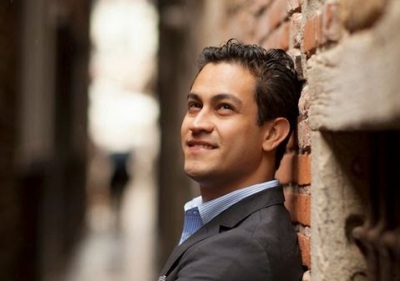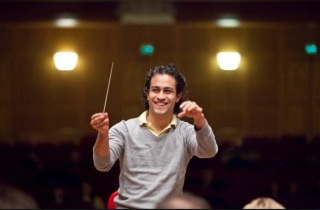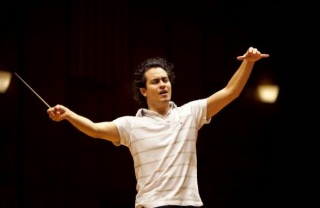“I saw children having lessons and giving concerts and I fell in love,” says Diego Matheuz remembering his first visit to El Sistema as a child. “I knew from that first day that I would be a musician all my life.”
Matheuz is in Perth rehearsing with the WA Symphony Orchestra. The conductor was a graduate of Venezuela’s El Sistema, a music education program which WASO has recently begun to implement in schools in Kwinana. The 30 year old is the perfect ambassador for the Sistema program with his deeply passionate approach to music and self-effacing personality, not to mention his pin-up good looks.
The Venezuelan El Sistema was founded in 1975 by economist and musician Jose Antonio Abreu whose vision to empower disadvantaged children through music has revolutionised both social intervention and music education worldwide.
Matheuz grew up in the city of Barquisimeto and while crime and drugs threatened many of his peers Matheuz spent his childhood making music. He attended Sistema for five hours a day most days of the week, working hard to fit in his normal schoolwork. He began the violin when he was nine and by fifteen was touring internationally with the Simon Bolivar Orchestra, the Sistema’s professional orchestra. Matheuz firmly believes music can create social transformation.
“An orchestra is like a perfect community. It is a wonderful way of learning to communicate, listen to each other and create a sense of community. If you are part of creating that experience as a child then as an adult it gives you hope; you have a vision, a possibility of a different life.”
Providing new opportunities to impoverished children is what inspired WASO’s community engagement manager Cassandra Lake who launched the orchestra’s Sistema music program with pre-primary classes in Kwinana last year.
“I am inspired by the stories from teachers saying the classroom dynamic is different because children are concentrating better and learning to work together,” Lake said. “I had a mum say to me ‘My son looks forward to going to school now. He’s singing all the time because of your program’. Another parent who was struggling to put a roof over their child’s head said to me they never imagined their child would have this opportunity.”
The community education initiative came from WASO’s desire to be more relevant to the community in which they operate. 300 students from Medina Primary School, Kwinana Christian School and North Parmelia Primary School are having weekly group lessons using their inbuilt instrument – the voice – as a starting point. Lessons on stringed instruments will follow with the goal of forming an orchestra.
The Sistema approach is renowned for its joyful and encouraging atmosphere. Matheuz explains this is because the emphasis is on music making as a group rather than an individual pursuit.
“We are not thinking about competitions,” says Matheuz, “we don’t have the vision of creating soloists like a conservatorium would. It is more about being a group, an orchestra, like being a family together. In football you have a psychologist to keep the team together because there are too many ‘stars’. But an orchestra doesn’t need that because the focus is the music.”
Despite (or because of) the democratic ideology Sistema’s graduate list includes plenty of stars. 33 year old Gustavo Dudamel is chief conductor of the Los Angelos Philharmonic and Edicson Ruiz plays bass with the Berlin Philharmonic. And of course Matheuz who made his professional debut in 2008 with Orchestra Mozart in Bolognaand is now principal conductor of Teatro la Fenice and principal guest conductor with the Melbourne Symphony Orchestra and Orchestra Mozart. Matheuz has attracted the attention of mentors like Daniel Barenboim, Claudio Abbado and Abreu and is now considered global hot property. But he deflects the focus away from the individual.
“I am lucky to have all these people and my family supporting me,” he says. “I thank God for this opportunity.”
This weekend Matheuz will conduct Rachmaninov’s Symphony No 2 with WASO which he promises will give the audience a vision of their own.
“This piece can make you cry and fall in love and remember things, it gives you hope. It gives you a very special moment and that is what I hope the audience will experience.”


